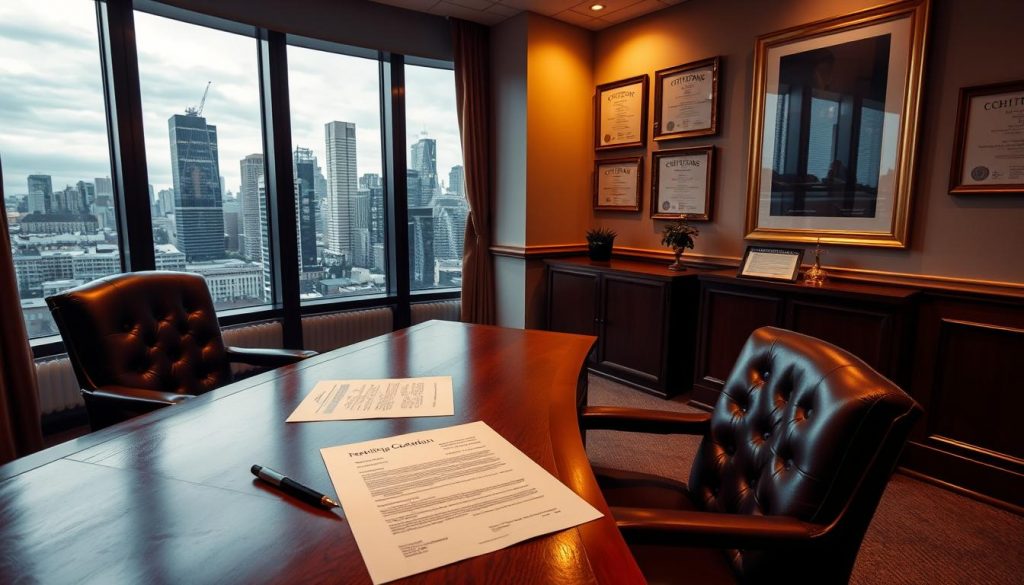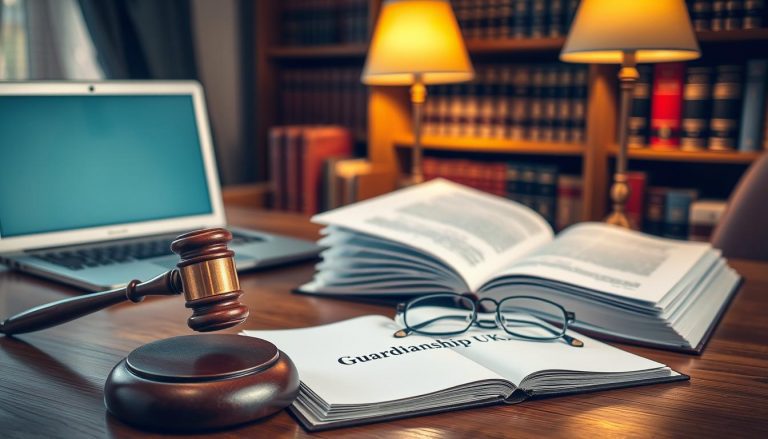Choosing a legal guardian is a crucial decision for parents, ensuring their child’s well-being in the event of their passing. A legal guardian is an individual granted the authority to care for a child, making important decisions about their upbringing, education, and welfare.
We understand the importance of this decision and are here to guide you through the process. In the UK, a legal guardian can be a family member, friend, or another trusted individual. When selecting a guardian, it’s essential to consider their ability to provide a stable and loving environment for your child.
By appointing a legal guardian, you can have peace of mind knowing that your child’s needs will be met. We will help you navigate the process, ensuring that you make an informed decision about your child’s future.
Key Takeaways
- Appointing a legal guardian ensures your child’s well-being in the event of your passing.
- A legal guardian can be a family member, friend, or trusted individual.
- Consider the guardian’s ability to provide a stable and loving environment.
- Making an informed decision about your child’s future is crucial.
- We are here to guide you through the process of choosing a legal guardian in the UK.
Understanding the Role of a Legal Guardian in the UK
In the UK, the role of a legal guardian is crucial for ensuring the well-being of a child when their parents are unable to care for them. A legal guardian has the same legal status as a birth parent and is responsible for making important decisions regarding the child’s upbringing.

Definition of a Legal Guardian
A legal guardian is an individual appointed to care for a child and make decisions on their behalf. This role involves significant responsibilities, including providing a stable home environment, managing the child’s financial affairs, and making decisions about their education and healthcare.
Difference Between Guardianship and Parenthood
While both guardians and parents are responsible for a child’s welfare, there are key differences between the two roles. Parenthood typically involves biological or adoptive rights and responsibilities, whereas guardianship is often appointed when parents are unable to care for their child. Guardianship can be granted by a court or through a parental responsibility agreement.
Responsibilities of a Legal Guardian
The responsibilities of a legal guardian are multifaceted and include:
- Making decisions about the child’s education and upbringing
- Managing the child’s financial affairs and property
- Providing a stable and nurturing home environment
- Making healthcare decisions on behalf of the child
For more information on appointing a legal guardian, you can visit Legal & General’s guide on how to appoint a legal.
“The role of a legal guardian is not just about providing financial support; it’s about creating a stable and loving environment for the child to thrive.” –
Understanding these responsibilities is crucial for selecting the right person to act as a legal guardian for your child. It’s a decision that requires careful consideration and a deep understanding of the role and its implications.
Legal Requirements for Choosing a Guardian
Choosing a legal guardian for your child is a significant decision that is governed by specific legal requirements in the UK. These requirements are in place to ensure that the appointed guardian is capable of providing a stable and loving environment for your child.
To be eligible to act as a legal guardian, an individual must meet certain criteria. We outline these below:
Age and Capacity Restrictions
The potential guardian must be over 18 years old and have the mental capacity to take on the responsibilities associated with guardianship. This means they should be able to make informed decisions and understand the implications of their role.
Criminal Background Checks
While not always mandatory, it is prudent to consider the potential guardian’s background. A criminal background check can provide insight into whether the individual has any convictions that could impact their suitability as a guardian. We recommend discussing this aspect with your legal advisor to understand the process and implications.
For more information on legal documents and processes, you can visit our page on where to get lasting power of attorney forms in the.
Consent of the Proposed Guardian
It is crucial that the proposed guardian is willing to accept the role. Their consent is essential before making any formal arrangements. Discussing the responsibilities and expectations with the potential guardian ensures they are fully aware of what is involved.
The key legal requirements are summarised in the following list:
- The guardian must be at least 18 years old.
- They must have the mental capacity to undertake the responsibilities.
- A criminal background check is advisable to assess their suitability.
- The proposed guardian must give their consent to the appointment.
By understanding and adhering to these legal requirements, you can ensure that your child’s welfare is protected and that the appointed guardian is well-equipped to provide the necessary care.
Types of Legal Guardians in the UK
Understanding the different types of legal guardianship available in the UK is crucial for making informed decisions about your child’s future. In the UK, the legal system recognises various guardianship arrangements, each designed to meet different family needs and circumstances.
Full Guardianship
Full guardianship grants the guardian complete responsibility for the child’s welfare, including decisions about their upbringing, education, and financial management. This type of guardianship is typically considered when the parents are unable to care for the child due to serious illness, death, or other significant life events.
Key aspects of full guardianship include:
- Making important decisions regarding the child’s life, such as education and healthcare.
- Managing the child’s financial affairs, including any inheritance or assets.
- Providing a stable and nurturing environment for the child.
Limited Guardianship
Limited guardianship, on the other hand, involves granting specific powers to the guardian for a defined period or under certain conditions. This type of guardianship is useful when the parents need support but still wish to maintain some decision-making authority.
Examples of limited guardianship include:
- Deciding on the child’s educational needs without having full control over other aspects of their life.
- Managing specific financial matters, such as a child’s inheritance, while the parents retain other responsibilities.
Temporary Guardianship
Temporary guardianship is a short-term arrangement that provides care for the child until the parents are able to resume their responsibilities. This can be due to temporary illness, travel, or other short-term circumstances that prevent the parents from caring for the child.
Temporary guardianship can be beneficial in situations such as:
- A parent’s temporary hospitalisation or illness.
- Parents needing to travel for work or other reasons.
- Other short-term family emergencies.
By understanding the different types of legal guardianship available, parents can make informed decisions that best suit their child’s needs and their family’s circumstances. Whether it’s full, limited, or temporary guardianship, each type serves a unique purpose and can provide the necessary support and care for the child.
How to Choose a Legal Guardian
Selecting the right legal guardian is a vital decision that impacts your child’s future. When making this choice, it’s essential to consider several key factors to ensure that the selected guardian is both willing and able to take on the responsibilities involved.
Evaluating Potential Guardians
Evaluating potential guardians involves a thorough assessment of their suitability to care for your child. We recommend considering the following aspects:
- Their ability to provide a stable and loving environment
- Their financial stability and ability to manage your child’s assets
- Their values and parenting style to ensure they align with yours
- Their age, health, and energy levels to keep up with your child’s needs
- Their willingness to take on the role and their understanding of the responsibilities involved

Importance of Trust and Compatibility
Trust and compatibility are crucial when choosing a legal guardian. You need to have faith in the guardian’s ability to make decisions that are in your child’s best interests. Compatibility with your values and parenting style is also vital to provide continuity for your child.
Assessing compatibility involves considering whether the potential guardian’s lifestyle and beliefs align with yours. This alignment helps ensure that your child is raised with the values and principles you deem important.
Discussing Responsibilities with Candidates
Once you have identified potential guardians, it’s essential to have an open and honest discussion with them about the responsibilities involved. This conversation should cover:
- The legal and financial responsibilities of guardianship
- The day-to-day care and decisions involved in raising your child
- Any specific needs or circumstances your child may have
- The guardian’s expectations and any concerns they may have
Having this conversation helps ensure that the guardian is fully informed and committed to their role. It also provides an opportunity for you to gauge their willingness and suitability to act as a guardian.
The Process of Appointing a Legal Guardian
Picking a legal guardian in the UK involves a formal legal process that includes specific documentation and potentially, court applications. This process is crucial for ensuring that your loved ones are cared for according to your wishes.
To appoint a legal guardian, one must consider several legal requirements and steps. This not only involves choosing the right person but also ensuring that the legal framework is appropriately set up.
Legal Documentation Required
The first step in appointing a legal guardian is to prepare the necessary legal documentation. This typically involves drafting or updating your will to include the appointment of a guardian.
It’s essential to consult with a legal professional to ensure that all documents are correctly prepared and executed. They can guide you through the process, making sure that your wishes are legally binding.
Key Documents Include:
- A will that clearly states your choice of guardian
- Any existing powers of attorney or other relevant legal documents
- Documentation that outlines your reasons for choosing the guardian (though not always legally required, it can be helpful)
Changes to Existing Wills
If you already have a will, you may need to make changes to it to appoint a legal guardian. This involves updating your will to include the guardian’s details and the specific responsibilities you wish them to have.
It’s crucial to review your will regularly and update it as necessary to reflect any changes in your circumstances or wishes.
| Aspect to Review | Why It’s Important | Action Required |
|---|---|---|
| Guardian’s Details | To ensure the right person is appointed | Update with new guardian information if necessary |
| Responsibilities | To clarify the guardian’s role | Specify the duties and powers of the guardian |
Court Applications for Guardianship
In some cases, appointing a legal guardian may require a court application, especially if there are disputes or if the situation is complex.
“The court’s primary concern is the welfare of the child or individual needing guardianship. They will assess the suitability of the proposed guardian and make a decision based on the best interests of the individual.”
Court applications involve submitting the necessary paperwork and potentially attending a hearing. Legal representation is highly recommended to navigate this process effectively.

By understanding the legal process involved in appointing a legal guardian, you can ensure that your loved ones are protected and cared for according to your wishes.
The Impact of Cultural and Religious Beliefs
The choice of a legal guardian is often shaped by one’s cultural background and religious affiliations. In the UK, where communities are rich in diverse cultural and religious heritage, understanding these influences is crucial.
Considering Cultural Values
Cultural values can significantly affect the upbringing and care of a child. For instance, certain cultures place a strong emphasis on family ties and community involvement. When choosing a guardian, it’s essential to consider whether they share and can uphold these cultural values.
Some key cultural considerations include:
- Family traditions and customs
- Language and communication styles
- Community expectations and support networks
Religious Influences on Guardianship
Religious beliefs can also play a pivotal role in guardianship decisions. The religious upbringing of a child is a significant consideration, with many parents wishing to ensure their child is raised according to their faith’s teachings and practices.
When evaluating potential guardians, consider their:
- Adherence to the family’s religious practices
- Willingness to raise the child within the faith
- Ability to provide a religiously supportive environment
Integrating Diverse Perspectives
Integrating diverse cultural and religious perspectives into guardianship decisions can be complex but is essential for making an informed choice. It’s about finding a balance that respects the child’s heritage while ensuring their well-being.
| Cultural/Religious Aspect | Considerations for Guardianship |
|---|---|
| Cultural Traditions | Ensuring the guardian can maintain family customs and community ties. |
| Religious Practices | Assessing the guardian’s commitment to the child’s religious upbringing. |
| Community Support | Evaluating the availability of a supportive community for the child. |
By carefully considering these factors, parents can make a more informed decision when choosing a legal guardian, ensuring that their child’s cultural and religious heritage is preserved.
The Role of Social Services
In the UK, social services are key players in the appointment of legal guardians, particularly when concerns about a child’s welfare arise. We understand that the involvement of social services can be a significant factor in the guardianship process.
When Social Services Get Involved
Social services may become involved if there are concerns about a child’s welfare or well-being. This can happen in various situations, such as when a parent is unable to care for their child due to illness or when there are allegations of neglect or abuse. We work closely with social services to ensure that the child’s needs are met.
- Concerns about a child’s welfare or well-being
- Parental inability to care for the child
- Allegations of neglect or abuse
Support Offered by Social Services
Social services provide a range of support to children and families in need. This can include:
- Assessing the child’s needs and circumstances
- Providing guidance on the guardianship process
- Offering support to the proposed guardian
We recognize the importance of the support offered by social services and work collaboratively with them to ensure the best possible outcomes for the child.
Navigating Social Service Recommendations
Navigating the recommendations made by social services can be challenging. We advise parents to:
- Understand the concerns raised by social services
- Cooperate fully with social service assessments
- Seek legal advice if necessary
By working together with social services, we can ensure that the child’s needs are prioritized and that the guardianship process is as smooth as possible.
The Importance of Communication
Effective communication is the backbone of a successful guardianship arrangement. When appointing a legal guardian, it’s not just about the legalities; it’s about ensuring that all parties involved are on the same page.
Discussing Guardian Choices with Family
It’s essential to have an open and honest discussion with your family about your choice of guardian. This can help prevent misunderstandings and ensure that everyone is comfortable with the decision. As one expert puts it, “Transparency is key when it comes to family decisions.”
When discussing your guardian choices with family, consider the following:
- Explain your reasons for choosing a particular guardian.
- Listen to their concerns and address them openly.
- Be prepared to provide additional information or reassurance.
Ensuring the Child’s Voice is Heard
If the child is old enough, it’s crucial to involve them in the decision-making process. This can help them feel more secure and understood. As a quote from a child psychologist suggests, ”
The child’s perspective is invaluable in guardianship decisions.
”
To ensure the child’s voice is heard:
- Have age-appropriate conversations about the guardianship.
- Consider their feelings and concerns.
- Involve them in meetings or discussions where appropriate.
Regular Updates and Check-ins
Guardianship is not a one-time decision; it requires ongoing communication and updates. Regular check-ins can help ensure that the guardian is fulfilling their responsibilities and that the child’s needs are being met.
Best practices for regular updates include:
- Scheduling regular meetings with the guardian.
- Keeping records of the child’s well-being and progress.
- Being open to adjusting the guardianship arrangement as needed.
Reviewing and Updating Guardian Appointments
As circumstances change, it’s crucial to review and update guardian appointments to ensure they remain relevant and effective. Life events such as moving home, changes in financial status, or shifts in family dynamics can all impact the suitability of your chosen guardian.
When to Reassess Guardian Choices
It’s advisable to reassess your guardian choices during significant life events or at regular intervals, such as every few years. This ensures that your chosen guardian remains capable and willing to take on the responsibilities.
- Changes in your child’s needs or circumstances
- Relocation to a different part of the UK
- Significant changes in your financial situation
Life Changes that Necessitate Updates
Certain life changes may necessitate updates to your guardian appointments. These can include changes in your family structure, such as divorce or the birth of additional children, as well as changes in your guardian’s circumstances.
| Life Change | Potential Impact on Guardian Appointment |
|---|---|
| Divorce or remarriage | May require reassessment of the guardian’s suitability and willingness to serve. |
| Birth of additional children | May necessitate updating the guardian appointment to include the new children. |
| Guardian’s change in health or financial status | Could impact their ability to serve as a guardian, requiring an update. |
Formal Process for Changes
Updating a guardian appointment involves a formal process that includes reviewing and potentially revising your legal documentation. This may involve consulting with a legal professional to ensure that all changes are made in accordance with UK law.
Steps to Update a Guardian Appointment:
- Review your current legal documents and guardian appointments.
- Assess the need for changes based on current circumstances.
- Consult with a legal professional to draft the necessary updates.
- Execute the updated documents according to UK legal requirements.
What to Do if a Guardian Cannot Fulfil Their Role
Should a guardian become unable to perform their duties, a swift and effective replacement process is vital. The well-being and care of the child depend on it. In such situations, it’s essential to remain calm and take immediate, informed action.
Finding an Alternative Guardian
Identifying a new guardian involves careful consideration and evaluation. You should assess potential candidates based on their ability to provide a stable and loving environment. Key factors to consider include:
- The candidate’s relationship with the child
- Their ability to provide financial support
- Their willingness to take on the responsibilities of guardianship
It’s also crucial to discuss the role and its responsibilities with the potential guardian to ensure they are fully aware and willing to accept the challenge.
Legal Steps for Replacing a Guardian
Replacing a guardian involves legal procedures that must be followed carefully. The process typically involves:
- Notifying the court of the need to replace the guardian
- Filing the necessary legal documents to initiate the replacement process
- Attending a court hearing where the appointment of a new guardian is decided
It’s advisable to seek legal counsel to navigate these steps effectively and ensure compliance with UK laws and regulations.
Temporary Solutions Until a New Guardian is Appointed
In some cases, there may be a delay between the original guardian’s inability to serve and the appointment of a new guardian. During this period, a temporary arrangement may be necessary. This could involve:
- Temporary foster care
- A short-term guardianship arrangement with a trusted family member or friend
These temporary measures are crucial for maintaining stability for the child until a permanent solution is in place.
By understanding the steps involved in replacing a guardian and having a plan in place, you can ensure the continued well-being of the child. Whether it’s finding an alternative guardian, navigating the legal steps, or implementing temporary solutions, being prepared is key.
Resources for Parents Considering Guardianship
As we have discussed throughout this article, appointing a guardian for your minor children is a crucial decision that requires careful consideration. To support you in this process, we have compiled a list of valuable resources that can provide guidance and assistance.
Government Resources and Guidance
For authoritative information on guardianship, you can visit the UK Government’s website, which offers guidance on appointing guardians for minor children. This resource can help you understand the legal requirements and responsibilities involved.
Support and Legal Advice
Additionally, there are various support groups and legal advice services available that specialize in guardianship. These organizations can offer expert advice and emotional support, helping you navigate the complexities of guardianship. You can find resources for guardianship in the UK through organizations that provide family law guidance.
Further Reading and Information
For those seeking more in-depth information, there are numerous books and articles on guardianship in the UK that can provide valuable insights. These resources can help you make an informed decision when choosing a guardian for your children.


